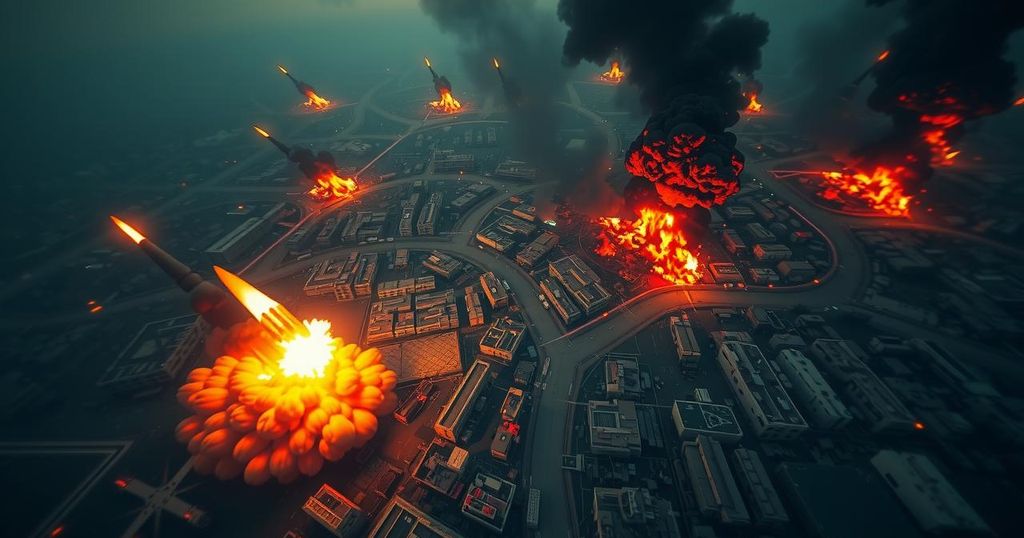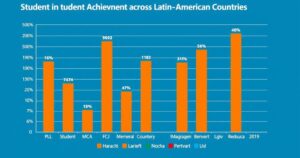Escalating Conflict: Rocket Attacks from Lebanon Claim Lives in Israel, IDF Strikes in Syria

On Thursday, rocket fire from Lebanon resulted in the deaths of seven individuals in northern Israel, including four foreign workers, during the deadliest attacks since Israel’s recent military actions began. The ongoing conflict with Iranian-backed Hezbollah follows extensive violence that erupted post-Hamas’s attack on October 7. The IDF retaliated with airstrikes in Syria against Hezbollah positions. U.S. diplomats have sought ceasefires while the situation remains dire with significant casualties reported on both sides.
On Thursday, a series of rocket attacks from Lebanon killed at least seven individuals in northern Israel, marking the deadliest incident of its kind since the onset of recent hostilities. Among the deceased were four foreign workers. The assaults struck two separate locations amidst ongoing diplomatic efforts by U.S. officials who are trying to establish cease-fires in both Lebanon and Gaza, with the aim of de-escalating the ongoing conflicts involving Iran-backed factions in the region. Since the escalation of violence on October 7, when Hamas conducted a terrorist attack from the Gaza Strip, Hezbollah has consistently retaliated against Israel with rockets, drones, and missiles. Both Hezbollah and Hamas are recognized as Iranian proxies and are classified as terrorist organizations by the United States, Israel, and several other nations. In retaliation to the attacks, the Israel Defense Forces (IDF) reported conducting airstrikes on sites in western Syria, near Qusair, which they alleged were being used by Hezbollah for arms storage and smuggling into Lebanon. This strikes resulted in additional fatalities, with reports indicating at least five casualties from the Syrian airstrikes. The situation along Israel’s northern border intensified following the IDF’s airstrike campaign in Lebanon last month, which reportedly resulted in the deaths of many high-ranking Hezbollah officials. Since the announcement of ground forces entering Lebanon in October, the death toll for Israeli military personnel has risen, with Lebanese authorities reporting approximately 2,000 civilian deaths due to airstrikes. The northern Israeli town of Metula, positioned close to the Lebanese border, was specifically targeted in the latest rocket fire, leading to significant civilian casualties. The nationalities of the foreign workers killed in these recent strikes remain undisclosed. Moreover, the medical organization Magen David Adom confirmed the fatalities of two other Israeli civilians in Haifa. The IDF reported that about 25 rockets were launched from Lebanon, primarily impacting agricultural areas where civilians were gathering during the olive harvest. Hezbollah’s new leader, Sheikh Naim Qassem, has stated that the group intends to continue its operations against Israel until it is presented with acceptable cease-fire terms. His comments suggest that Hezbollah retains the capability to sustain a prolonged conflict. Concurrently, Israel continues to urge evacuations of certain regions in southern Lebanon, as its ongoing airstrikes have led to additional civilian deaths in Lebanon. Since the conflict began more than a year ago, the humanitarian impact has been severe, with wide-ranging casualties and extensive displacement reported in Lebanon. In Israel, combat-related fatalities have reached approximately 68 individuals, with a notable number of military personnel among the deceased. Following these developments, efforts by U.S. officials to mediate discussions on ceasefires and hostage releases are ongoing, although negotiations have stalled. Prime Minister Netanyahu has affirmed Israel’s commitment to national security while expressing skepticism regarding the effectiveness of proposed international peacekeeping arrangements in Lebanon. Proposals for cease-fires in both the Gaza and Lebanese theaters of conflict continue to face significant challenges as conflicting demands from various parties remain unresolved.
The ongoing conflict between Israel and Iran-backed groups, primarily Hezbollah and Hamas, has escalated significantly since early October 2023. This follows a brutal attack by Hamas that triggered intense military responses from Israel, including airstrikes in both Gaza and Lebanon. The complexities of the situation are further exacerbated by the geopolitical implications of Iranian influence in the region and the roles of foreign powers, including the United States, in seeking to broker a ceasefire amidst the violence. The humanitarian toll has been significant, with thousands of casualties on both sides and widespread displacement of populations affected by the conflict. Both sides continue to express strong strategic interests that complicate negotiations toward peace.
In summary, the current hostilities along Israel’s northern border serve as a stark reminder of the ongoing cycles of violence experienced in this region. The recent rocket attacks from Lebanon have resulted in tragic casualties, prompting significant military and diplomatic responses. As U.S. diplomats strive to mediate conditions for peace, the entrenched positions of the involved parties pose significant barriers. The humanitarian crisis continues to unfold, underscoring the urgent need for effective strategies to secure a ceasefire and alleviate civilian suffering.
Original Source: www.cbsnews.com





